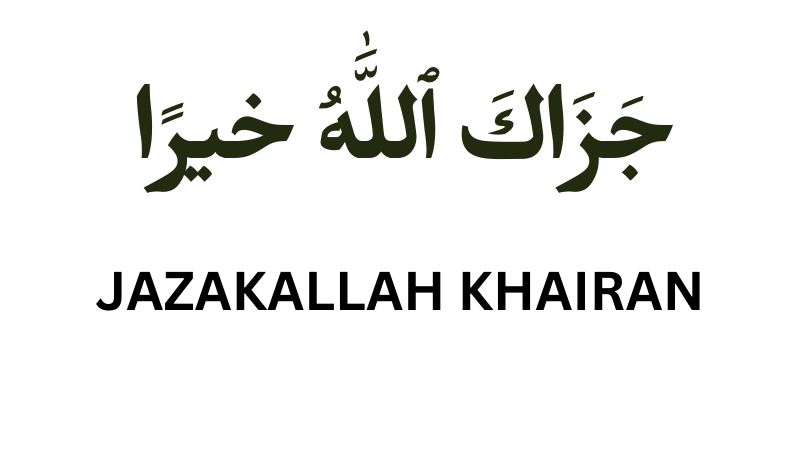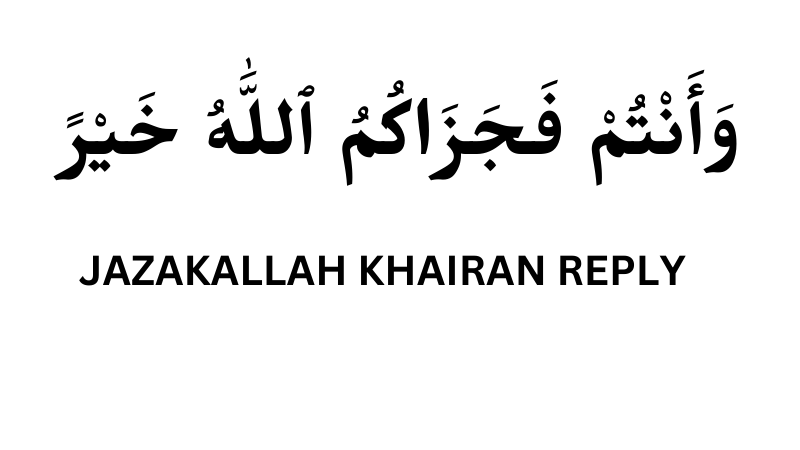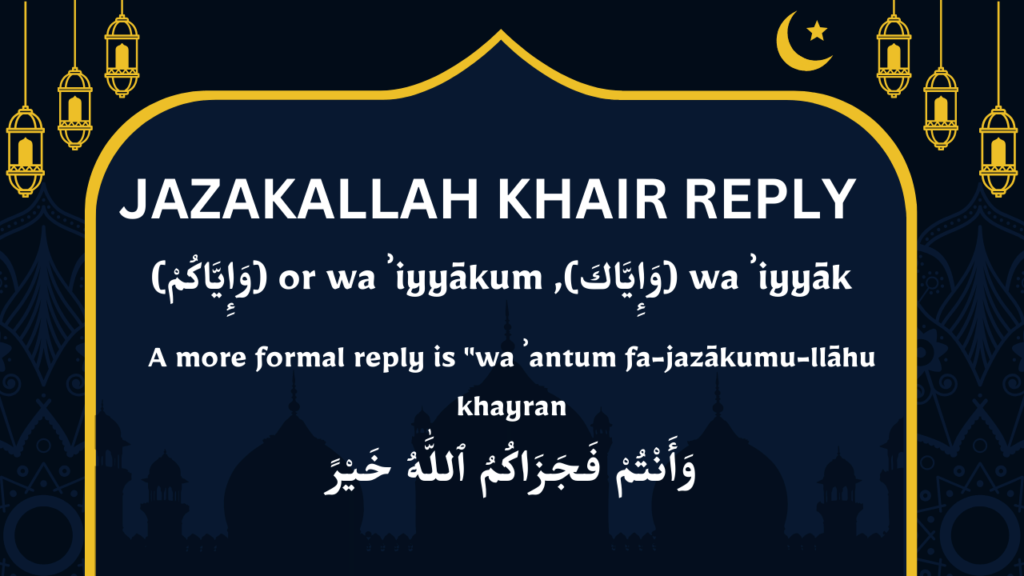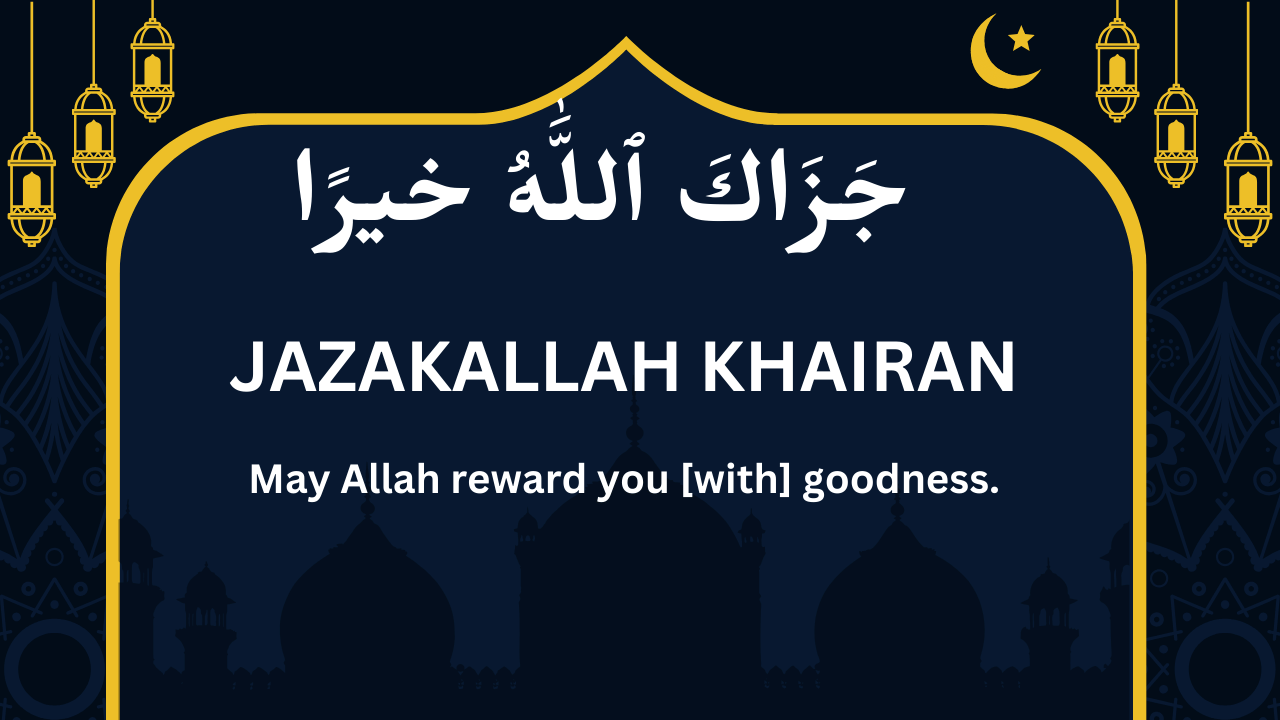Jazakallah Khair is a common Arabic phrase used by Muslims around the world to express gratitude and appreciation. It’s often used to thank someone for a favor, a kind gesture, or any act of kindness. The phrase is a combination of two words: “Jazakallah” and “Khair,” each with its own meaning.
I will discuss Jazakallah Khair meaning, reply to JazakALLAH khair and more. So, continue reading until the end.
Jazakallah Khair Meaning In English – جزاك اللهُ خيرً
The word “Jazakallah” is derived from the Arabic root word “jaza,” which means to reward or recompense. When you say “Jazakallah,” you are essentially asking Allah (God) to reward or repay the person you’re thanking “May Allah reward you [with] goodness”. It’s a way of acknowledging the kindness and conveying the hope that they will be blessed in return.
Khair means goodness or good. So when you add “Khair” to “Jazakallah,” you are specifically asking for the best of goodness or blessings for the person by saying Jazakallah Khair. It’s a way of saying that you not only appreciate what they’ve done but also wish them well in all aspects of life.
Jazakallah Khair In Arabic
In Arabic script, it is written as “جزاك اللهُ” for “Jazakallah” and “جزاك اللهُ خيرً” for “Jazakallahu Khairan.”

Common Spellings
When it comes to stating grace and blessings, there are several common spellings and variations of “Jazakallah Khair.” These variations include:
- “Jazakumullahu khairan,”
- “Jazakumullahu khair,”
- “Jazakallah khair,”
- “Jazak allahu khayran,” and
- “Jazakillah khair.”
Variations Of Jazakallah and their uses
Showing gratitude and offering blessings is an essential aspect of Islamic culture and etiquette. Just as in many languages, there are various ways to convey gratitude and blessings in Arabic. Here are some unique variations of stating thanks and blessings similar to “Jazakallah”:
- Allah Yajzik Khairan – الله يجزيك خيرا
- Jazakallah Khairan – جزاك الله خيرًا
- Jazakallahu kol Khair -جزاك اللهُ كل خير
How To Say Jazakallah To Male And Female?
When you want to thank someone and say “Jazakallah Khair” in Arabic, here’s how you can do it based on who you’re talking to:
- If you’re thanking a man and want to show gratitude, you can say: “Jazaak-Allaahu Khairan/Khair.“
- When you’re thanking a woman, you can say: “Jazaakillaahu Khairan/Khair.”
- Similarly, to show gratitude or appreciation to a group of people, you can say: “Jazakum Allahu Khairan.”

Reply To Jazakallah Khair?

When someone says “Jazakallah” to you, it’s a gracious expression of gratitude and goodwill in Islamic culture. Responding appropriately is not only polite but also reflects your respect for the person’s kind words. Here are some key takeaways on how to reply to “Jazakallah”:
1. The Common Response: “Wa Iyyaka” (for Males) and “Wa Iyyaki” (for Females)
The most common and simple way to respond to “Jazakallah” is by saying “wa iyyaka” for male or “wa iyyaki” for female. These phrases essentially mean “and to you too.” They are a polite way to reciprocate the good wishes and mention your gratitude for the kind words.
or can say:
- BarakAllahu feekum بارك الله فيكم
- BarakaAllahu feek(i) : بارك الله فيك
بارك الله فيكم means May Allah bless you
Example
Person A: “Jazakallah for helping me with my project.”
Person B: “Wa iyyaka, I’m happy to assist.”
2. The Formal Response: “Wa Antum fa Jazakumullahu Khayran” (For a Group):
In more formal situations, especially when responding to a group of people, you can use the phrase “Wa Antum fa Jazakumullahu khayran.” This phrase translates to “And you too, May Allah reward with Goodness.” It adds an extra layer of respect and blessings to your response.
Example
Person A: “Jazakallah to all the volunteers for their hard work.”
Person B: “Wa Antum fa Jazakumullahu khayran, may Allah bless all of you for your efforts.”
3. Observe Usage in Everyday Conversation
To become more familiar with how “Jazakallah” is used in everyday conversation, consider observing how Muslims use it on social media platforms like Twitter and Facebook.
It’s a common expression of gratitude and goodwill in various situations, from thanking someone for a favor to appreciating their kindness.
In addition to these common responses, there are variations and longer expressions of gratitude that can be used depending on the context and the level of formality in the conversation.
For example, you could say, “Jazakallah Khairan kaseeran,” which means “May Allah reward you abundantly with goodness.” This adds emphasis to your appreciation.
Jazakallah Importance In The Light Of Hadith
- The Prophet (Peace Be Upon Him) said:
“He who is favoured by another and says to his benefactor: `Jazak-Allah khairan (may Allah reward you well)’ indeed praised (the benefactor) satisfactorily.”
Riyad As-Salihin – [At-Tirmidhi]
Arabic/English book reference: Book 17, Hadith 1496
In simple terms, this hadith reminds us that simple words of obligation go a long way in strengthening our relationships and promoting positive values in our interactions with others. It’s not just about politeness; it’s about fostering a supportive and harmonious community.
- Narrated Usama bin Zaid (RA): Allah’s Messenger (ﷺ) said:
“If one is done a kindness and [expresses his gratitude] to his benefactor by saying ‘May Allah give you a good reward’, he has fully expressed his appreciation.”
[at-Tirmidhi reported it, and Ibn Hibban graded it Sahih (authentic)].
The importance of this second hadith lies in its practicality and simplicity. It teaches us that we don’t need elaborate or extravagant expressions of gratitude. Instead, a heartfelt and sincere prayer for the benefactor’s well-being and rewards from Allah is enough.
This hadith encourages us to be appreciative without the need for grand gestures, reminding us that gratitude can be shown in humble and meaningful ways.
When To Say Jazak ALLAH?
You can say “Jazakallah Khair” in various situations to convey gratitude and thankfulness. Some of the examples are below:
- A kind word: If someone says something nice to you or offers you a compliment, you can respond with “Jazakallah Khair” to show appreciation for their kind words.
- A favor: When someone goes out of their way to help you, whether it’s assisting with your homework or giving you a ride to the airport, mentioning gratitude with “Jazakallah Khair” is appropriate.
- A gift: Whether the gesture involves receiving flowers, candy, money, or any other type of gift, you can use “Jazakallah Khair” to thank the person for their thoughtful present.
Wrapping Up
“Jazakallah Khair” is a way for Muslims to say “thank you” with a heartfelt wish for blessings. It’s about showing appreciation and spreading kindness. This phrase reminds us of the importance of being grateful and kind in our everyday interactions, following the teachings of the Prophet Muhammad (Peace Be Upon Him).





Leave A Comment